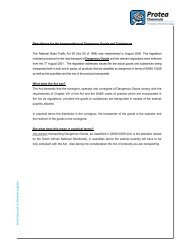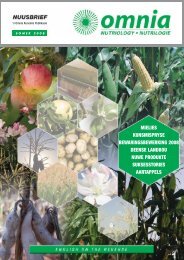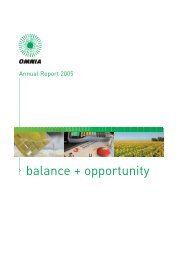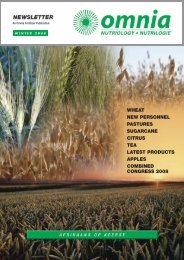omnia holdings annual report 2010 omnia holdings annu
omnia holdings annual report 2010 omnia holdings annu
omnia holdings annual report 2010 omnia holdings annu
Create successful ePaper yourself
Turn your PDF publications into a flip-book with our unique Google optimized e-Paper software.
54 OMNIA ANNUAL REPORT <strong>2010</strong> SUSTAINABILITY REPORT continued<br />
Omnia’s second nitric acid plant complex will boost local supply security<br />
in mining and agricultural supply chains<br />
Foreseeing the possibility of a significant increase in the demand<br />
for mining and fertilizer products in the future and to ensure<br />
local supply security, Omnia is making a R1,4 billion capital<br />
investment in the construction of a world-class nitric<br />
acid complex.<br />
This demand has been driven by significant growth in South and<br />
southern Africa’s mining sector – an 11% year-on-year increase<br />
in South Africa, in spite of economic downturn constraints,<br />
according to Statistics SA – and fuelled by an increasing demand<br />
for fertilizer to help South and southern Africa provide solutions<br />
to the world’s food security challenge, and drive sustainable<br />
development across the continent.<br />
This will be the first nitric acid plant of its kind to be built in<br />
South Africa since 1984, representing a milestone 30-year<br />
investment in the development of South African capacity to<br />
produce nitric acid and ammonium nitrate. The initiative will<br />
bring world-class technology to South Africa and guarantee the<br />
local supply of critical raw materials to Omnia’s downstream<br />
mining and agriculture businesses.<br />
The growth in both the agricultural and mining markets has been<br />
driven by international demand and development trends which<br />
are set to continue. The high demand in particular in the mining<br />
industry has placed significant pressure on the sector’s supply<br />
chains and subsequently revealed weaknesses in local<br />
supply security.<br />
The pressure on local product manufacturers has meant that<br />
suppliers had to consider sourcing additional product from<br />
overseas. However, importing ammonium nitrate is not a<br />
sustainable solution for the South African explosives industry, as<br />
it undermines the cost-effectiveness and competitiveness of the<br />
local industry. There is also increased demand for nitrogenrelated<br />
chemicals in agriculture and this industry would also be<br />
negatively impacted by constraints on local availability.<br />
Omnia has felt this pressure by experiencing an increasing<br />
shortage of a critical raw material, ammonium nitrate, a major<br />
component required for the production of fertilizer and<br />
explosives, which prompted us to start assessing the feasibility<br />
of building a second nitric acid plant complex. We have been<br />
building the market for 10 years and this investment will enable<br />
us to meet increased demand in both explosives and fertilizers,<br />
allowing us to leverage supply-side synergies between<br />
these businesses.<br />
Omnia sees the plant as a much-needed investment in the<br />
future of South Africa’s agricultural sector, enabling us to add<br />
greater value for South Africa’s farmers. Since Omnia’s existing<br />
plant is already operating at capacity – which means that the<br />
availability of nitric acid for our fertilizer usage has been<br />
restricted – the growth of our fertilizer business has been based<br />
on alternative raw material solutions, such as using urea and<br />
other nitrogenous products, as well as sourcing nitrate products<br />
from other producers.<br />
The plant is one of our biggest investments to date in South<br />
Africa and demonstrates the Group’s commitment to South<br />
Africa’s mining and agricultural sectors.<br />
This second nitric acid plant complex, developed in Sasolburg<br />
adjacent to our existing plant, will produce 1 000 tons per day,<br />
nearly 50% more than our current plant, and is scheduled to<br />
come on stream in 2012.<br />
The plant is expected to start production on the first day of<br />
operation at 60% to 70% of its full capacity, and is estimated to<br />
generate internal cost savings of about R280 million per <strong>annu</strong>m<br />
at this capacity level.<br />
To implement this project, Omnia is raising R1 billion in capital<br />
from our shareholders, who have given us their full support.<br />
It is significant that we have been able to raise 42,5% of our<br />
market cap in the form of additional shares in the turmoil of<br />
financial markets. And to raise it not as a rescue package –<br />
which many companies are having to do – but for growth shows<br />
the confidence that the management, board and shareholders<br />
have in the long-term future of the Group and its growth<br />
prospects. Raising the major portion of the capex required<br />
through equity leaves us with a very strong balance sheet to<br />
take up suitable growth opportunities and be well set for any<br />
further volatility in world financial markets, thereby significantly<br />
reducing the financial risks associated with embarking on a<br />
project of this nature.<br />
The remaining funding requirement for the project will be<br />
covered through a combination of internally generated funds and<br />
long-term project finance.<br />
We are confident that this investment will be highly capital<br />
efficient, as the company is set to benefit from the negotiation<br />
of favourable construction contracts during the economic<br />
downturn and favourable imported equipment prices achieved<br />
on the back of a strong rand. In addition, about one-half of the<br />
project value will be sourced locally.<br />
The new facilities will use best-in-class technology conforming<br />
to the highest standards of sustainable environmental<br />
development. Plant emissions will be significantly below<br />
legislation requirements. The facilities will have co-generation<br />
capacity, and will generate sufficient energy for their own<br />
requirements while contributing about 50% of the current<br />
factory’s energy needs, significantly cutting Omnia’s existing<br />
electricity supply requirements. This energy saving is important<br />
in the context of South Africa’s power stresses and could also<br />
form the basis of a bid to secure clean development mechanism<br />
funding for the investment.<br />
The new plant logistics also include investment in rail<br />
infrastructure, via state-of-the-art rail tankers, to comply<br />
with best-practice safety transportation standards.














